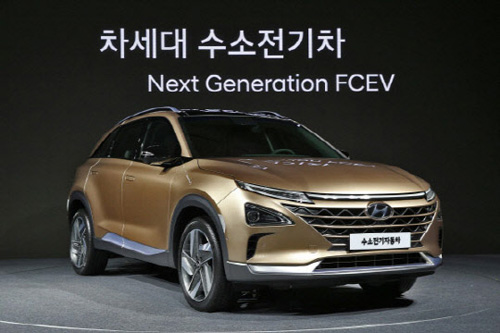Hyundai Motors in fight for hydrogen car against Toyota in US… Sortie for ‘Nexo’ in September
Kim Yang Hyuk | mj@ | 2018-01-26 11:18:23

According to industry sources on January 25, Hyundai plans to launch the next-generation hydrogen electric car `Nexso` in Korea first in March and to release it in Europe and the US sequentially. The annual production volume built by Hyundai Motor is around 3680 units. The car is expected to compete with Toyota Mirai, which currently ranks first in the US hydrogen electric car sales.
Nexo`s single-charge mileage is 580 km in Korea. The previous generation, ix35 (Tucson hydrogen electric vehicle) 415 km more than 165 km. This is ahead of Toyota Mirai`s 501km (US Environmental Protection Agency) charge mileage. Considering that Korea is using the American method, which is more demanding than Europe, the distance traveled by Charge is longer than that of Mirai.
The two companies` full-scale hydrogen competition is expected to take place in August when Nexon will launch in the US market. Mirai sold more than 4000 cumulative sales until last year. This is four times more than Hyundai`s 2013 cumulative sales of the first hydrogen electric car ix35 (Tucson). Considering that Mirai sold more than 3,000 units in January and February in the US in two years and three months, most sales were made in the United States. Toyota also said, "80% of the hydrogen cars sold in the US are Mirai."
It is because of the charging facility that the hydrogen car hegemony competition spreads not in Korea and Japan but in the United States. In the United States, 31 hydrogen filling stations have been installed in California, the fastest pace of diffusion of eco-friendly vehicles such as hydrogen cars. If the 12th of this year is added, it will exceed 40. New York and Boston also have 12 new ones.
Meanwhile, there are 11 domestic hydrogen filling stations. Five of them are for research purposes. The government plans to increase the number to 100 by 2020 and 310 by 2020, but there are many observations that it is unclear whether the plan will be implemented. It was originally planned to increase the number of hydrogen filling stations by granting private station operators with the right to operate highway rest areas, but it was because of the failure to secure funds.
An expert from the automobile industry said, "The government is not sure that the prospect of hydrogen car success is still uncertain, and it may be burdened to increase the infrastructure significantly."
By Kim Yang Hyuk mj@
